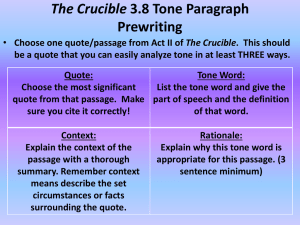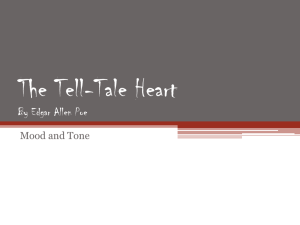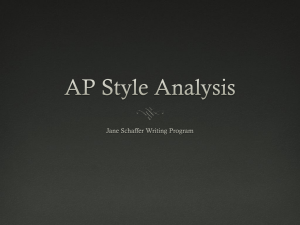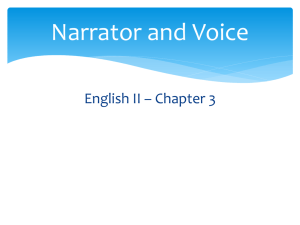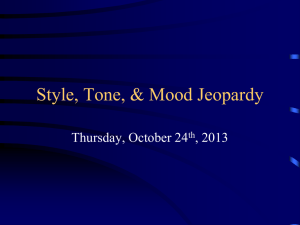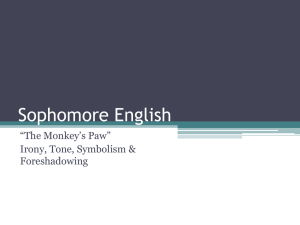The Crucible 3.8 Tone Paragraph
advertisement
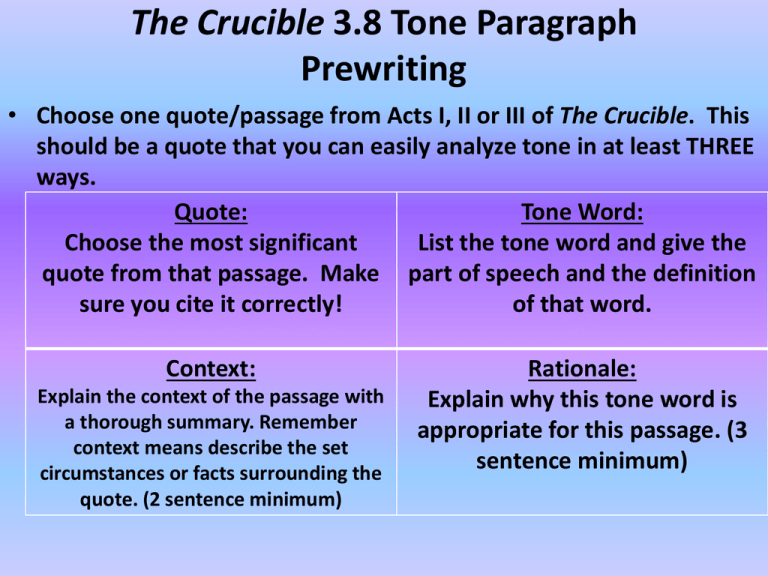
The Crucible 3.8 Tone Paragraph Prewriting • Choose one quote/passage from Acts I, II or III of The Crucible. This should be a quote that you can easily analyze tone in at least THREE ways. Quote: Tone Word: Choose the most significant List the tone word and give the quote from that passage. Make part of speech and the definition sure you cite it correctly! of that word. Context: Explain the context of the passage with a thorough summary. Remember context means describe the set circumstances or facts surrounding the quote. (2 sentence minimum) Rationale: Explain why this tone word is appropriate for this passage. (3 sentence minimum) The Crucible 3.8 Tone Paragraph Prewriting • Example from Bellringer: Quote: Proctor: “I say—I say—God is dead!” (226) Context: John Proctor yells this statement after he witnesses Mary return back to Abigail’s side and accuse him of witchcraft. This statement shows Proctor’s anger at the court for not believing the truth. Tone Word: Enraged (adjective) to put into a rage; to make very angry; infuriate Rationale: 1. The use of the exclamation point emphasizes that it is a powerful statement. 2. The repetition of words indicates JP’s frustration. 3. The short words indicate a loss of words because of frustration. The Crucible 3.8 Tone Paragraph • Format of a 3.8 Paragraph: 1. TS (topic sentence) 2. SS (support sentence) 3. EX (explanation) 4. SS (support sentence) 5. EX (explanation) 6. SS (support sentence) 7. EX (explanation) 8. CS (concluding sentence) The Crucible 3.8 Tone Paragraph • Format of a 3.8 Tone Paragraph: 1. TS: Tone and Quote 2. SS: First example from quote that supports tone 3. EX: Explain why that example supports that tone 4. SS: Second example from quote that supports tone 5. EX: Explain why that example supports that tone 6. SS: Third example from quote that supports tone 7. EX: Explain why that example supports that tone 8. CS: Overall significance of that tone word (tie it back to the context of the quote) Example Tone Paragraph • Quote: “I say—I say—God is dead!” (226) • Tone: Enraged • Example paragraph: (TS) The tone of John Proctor’s statement, “I say—I say—God is dead!” (226) could be described as enraged. (SS) One indication of this tone is through the use of the exclamation point. (EX) This punctuation mark is used when a statement should be said in a powerful manner and Proctor exclaims this statement because he is angry. (SS) Another indication of this tone is the repetition of the words “I say.” (EX) This repetition indicates a loss of words because he is frustrated due to the fact the judges refuse to believe the truth, choosing instead believe the lies of the girls, and this frustration intensifies the enraged tone. (SS) A final way this quote emphasizes an enraged tone is the usage of the short, terse words. (EX) When one is enraged one does not typically think through his words, and these short words demonstrate his initial reaction to the situation. (CS) The enraged tone best fits this phrase because it emphasizes Proctor’s anger at the judges for not believing the truth of the situation.

